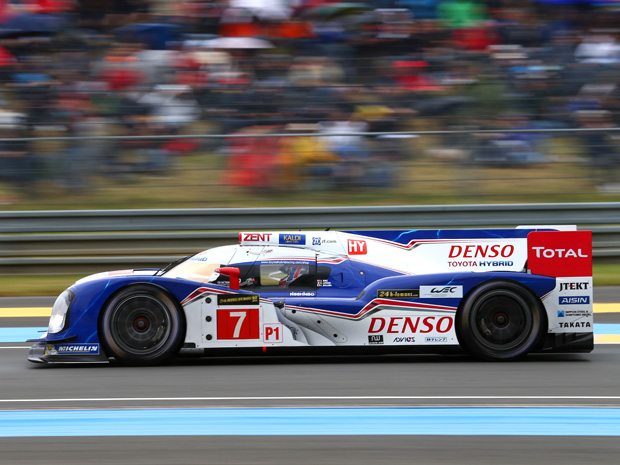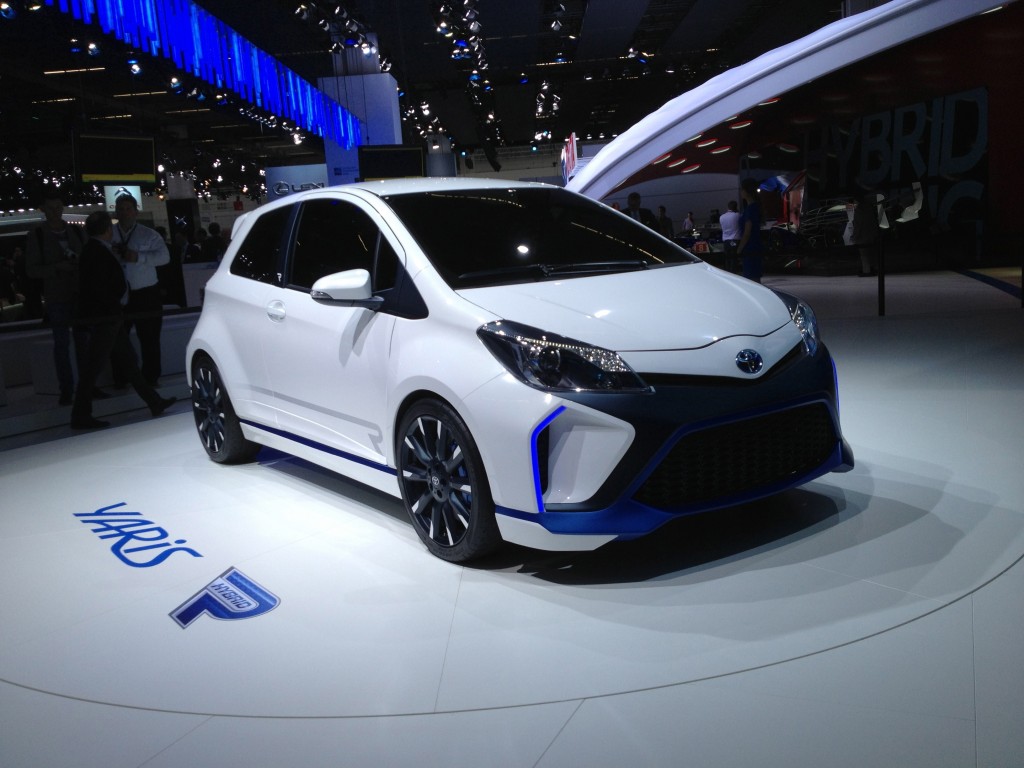Toyota’s “race on Sunday, sell on Monday” hybrid strategy right on track
 Story by John LeBlanc
YPSILANTI, MICH. — The “race on Sunday, sell on Monday” strategy has been around since Henry Ford’s 999 racecars appeared at the dawn of the automotive industry in 1901. More than a century later, Japan’s Toyota is continuing that tradition with its latest TS030 racer, the first hybrid racecar to be entered in the FIA World Endurance Championship series, highlighted by the annual 24 Hours of LeMans race.
As race fans know, the Volkswagen Group’s Audi brand has been the most recent dominant force at the French endurance race. Audi racecars have won 11 out of the 13 LeMans races the German brand has entered since 2000, all the while, promoting its production car technologies like turbocharged diesel engines and lightweight materials. But after an absence of 13 years, Japan’s Toyota returned to the Saturday-to-Sunday LeMans race in 2012, primarily to help sell production cars the following Monday.
The current Toyota TS030 racecar is not the first time the Japanese automaker has taken on the mammoth task of competing at the famous French race. Toyota racecars first appeared at LeMans in the 1980s. The automaker’s last LeMans effort was the 1997 to 1999 TS020, also known as the GT-One. The factory-backed cars never won the race, but in 1999, the GT-Ones were the fastest vehicles on the track, setting a lap record that stood until 2006.
Story by John LeBlanc
YPSILANTI, MICH. — The “race on Sunday, sell on Monday” strategy has been around since Henry Ford’s 999 racecars appeared at the dawn of the automotive industry in 1901. More than a century later, Japan’s Toyota is continuing that tradition with its latest TS030 racer, the first hybrid racecar to be entered in the FIA World Endurance Championship series, highlighted by the annual 24 Hours of LeMans race.
As race fans know, the Volkswagen Group’s Audi brand has been the most recent dominant force at the French endurance race. Audi racecars have won 11 out of the 13 LeMans races the German brand has entered since 2000, all the while, promoting its production car technologies like turbocharged diesel engines and lightweight materials. But after an absence of 13 years, Japan’s Toyota returned to the Saturday-to-Sunday LeMans race in 2012, primarily to help sell production cars the following Monday.
The current Toyota TS030 racecar is not the first time the Japanese automaker has taken on the mammoth task of competing at the famous French race. Toyota racecars first appeared at LeMans in the 1980s. The automaker’s last LeMans effort was the 1997 to 1999 TS020, also known as the GT-One. The factory-backed cars never won the race, but in 1999, the GT-Ones were the fastest vehicles on the track, setting a lap record that stood until 2006.
 While the 1990's Toyota GT-One was a more traditional gas-only racecar, today’s TS030 hybrid is more technically advanced. Its 3.4-litre eight-cylinder gas engine is aided by a 500 kilojoule super capacitor energy recovery unit that sends energy recovered from the car’s braking system to power the Toyota’s rear wheels. While the all-wheel-drive Audi R18 e-tron quattro racecars were considered the favorites in last year’s FIA World Endurance Championship series, the Toyota hybrid racecar took second place to the Audi in only the TS030’s second race, at England’s Silverstone track in 2012. That early success was followed by the Toyota’s first win, later in the season in Brazil.
At this year’s 24 Hours of LeMans, the TS030 ended up not taking the chequered flag. However, Toyota did take and fourth place at the Circuit de la Sarthe. From a marketing standpoint, Toyota reiterated its intentions with its hybrid racer, saying “the team's performance demonstrate the bulletproof reliability of both TS030 Hybrid racers, it has also become ever more evident that hybrid technology is now an integral part of world-class motorsport.”
As one of the 2013 LeMans TS030 drivers, Alex Wurz, put it: "There is no more way to win this race [Le Mans 24 Hours] without hybrid."
While the 1990's Toyota GT-One was a more traditional gas-only racecar, today’s TS030 hybrid is more technically advanced. Its 3.4-litre eight-cylinder gas engine is aided by a 500 kilojoule super capacitor energy recovery unit that sends energy recovered from the car’s braking system to power the Toyota’s rear wheels. While the all-wheel-drive Audi R18 e-tron quattro racecars were considered the favorites in last year’s FIA World Endurance Championship series, the Toyota hybrid racecar took second place to the Audi in only the TS030’s second race, at England’s Silverstone track in 2012. That early success was followed by the Toyota’s first win, later in the season in Brazil.
At this year’s 24 Hours of LeMans, the TS030 ended up not taking the chequered flag. However, Toyota did take and fourth place at the Circuit de la Sarthe. From a marketing standpoint, Toyota reiterated its intentions with its hybrid racer, saying “the team's performance demonstrate the bulletproof reliability of both TS030 Hybrid racers, it has also become ever more evident that hybrid technology is now an integral part of world-class motorsport.”
As one of the 2013 LeMans TS030 drivers, Alex Wurz, put it: "There is no more way to win this race [Le Mans 24 Hours] without hybrid."
 As Toyota’s hybrid racing efforts seem to be on-track, what is the Japanese automaker doing to capitalize on its success? We’ll got part of that answer at this year’s Frankfurt auto show, and eventually, in Toyota (or Lexus or Scion) showrooms in a few years.
As it starts ramping up for the launch of a new-generation of Toyota production car hybrid technology, led by the forthcoming new Prius in 2015, Toyota showcased its past, present and future hybrid vehicles at this year’s biennial German show, highlighted by the debut of the Toyota Yaris Hybrid R concept.
Using a two-door Yaris hatchback as a foundation, the Hybrid R uses a Toyota Motorsport-designed 1.6-litre four-cylinder gas engine and two electric motors for a combined power output of more than 400 horsepower — about four times that of the current Canadian-market Yaris. Also noteworthy: the Yaris Hybrid R uses the TS030 racecar’s super capacitor energy recovery unit.
As Toyota’s hybrid racing efforts seem to be on-track, what is the Japanese automaker doing to capitalize on its success? We’ll got part of that answer at this year’s Frankfurt auto show, and eventually, in Toyota (or Lexus or Scion) showrooms in a few years.
As it starts ramping up for the launch of a new-generation of Toyota production car hybrid technology, led by the forthcoming new Prius in 2015, Toyota showcased its past, present and future hybrid vehicles at this year’s biennial German show, highlighted by the debut of the Toyota Yaris Hybrid R concept.
Using a two-door Yaris hatchback as a foundation, the Hybrid R uses a Toyota Motorsport-designed 1.6-litre four-cylinder gas engine and two electric motors for a combined power output of more than 400 horsepower — about four times that of the current Canadian-market Yaris. Also noteworthy: the Yaris Hybrid R uses the TS030 racecar’s super capacitor energy recovery unit.
 The Japanese automaker says the Frankfurt concept represents only "possible future hybrid development ideas that can deliver greater performance and driver rewards.” In reality, the super capacitor technology is not suited for road car use. During the Toyota Hybrid World Tour being held here just outside of Detroit, Satoshi Ogiso, managing officer at Toyota, said the super capacitor is quick to charge and recharge, but cannot store energy like the batteries for road going hybrid cars.
However, with the Japanese automaker’s desire to inject some personality in its Toyota, Scion and Lexus brands, expect to see the electric part of the gas-electric hybrid equation used as a performance-enhancing tool for future production vehicles
While many enthusiasts see a higher-performing Scion FR-S as a prime candidate for a hybrid boost of power, more than likely the production version of the Lexus LF-LC sports coupe concept — a spiritual replacement for the 1990s Toyota Supra — will fly Toyota’s high-performance hybrid flag, taking on other Japanese super sports cars like the Nissan GT-R and forthcoming Honda NSX.
The Japanese automaker says the Frankfurt concept represents only "possible future hybrid development ideas that can deliver greater performance and driver rewards.” In reality, the super capacitor technology is not suited for road car use. During the Toyota Hybrid World Tour being held here just outside of Detroit, Satoshi Ogiso, managing officer at Toyota, said the super capacitor is quick to charge and recharge, but cannot store energy like the batteries for road going hybrid cars.
However, with the Japanese automaker’s desire to inject some personality in its Toyota, Scion and Lexus brands, expect to see the electric part of the gas-electric hybrid equation used as a performance-enhancing tool for future production vehicles
While many enthusiasts see a higher-performing Scion FR-S as a prime candidate for a hybrid boost of power, more than likely the production version of the Lexus LF-LC sports coupe concept — a spiritual replacement for the 1990s Toyota Supra — will fly Toyota’s high-performance hybrid flag, taking on other Japanese super sports cars like the Nissan GT-R and forthcoming Honda NSX.
 First seen at the 2012 Detroit auto show, the LF-LC (for Lexus Future-Luxury Coupe) sported a front-engine, rear-wheel drive drivetrain layout, with what Toyota vaguely called a “next-generation Advanced Lexus Hybrid Drive system.”
Expected to arrive in the next few years, the Lexus LF-LC may be the first road car LeMans fans will want to buy on the Monday morning after the race.
First seen at the 2012 Detroit auto show, the LF-LC (for Lexus Future-Luxury Coupe) sported a front-engine, rear-wheel drive drivetrain layout, with what Toyota vaguely called a “next-generation Advanced Lexus Hybrid Drive system.”
Expected to arrive in the next few years, the Lexus LF-LC may be the first road car LeMans fans will want to buy on the Monday morning after the race.
Comments
One Response to “Toyota’s “race on Sunday, sell on Monday” hybrid strategy right on track”





September 19th, 2013 @ 9:16 am
[…] Toyota's “race on Sunday, sell on Monday” hybrid strategy right on … […]